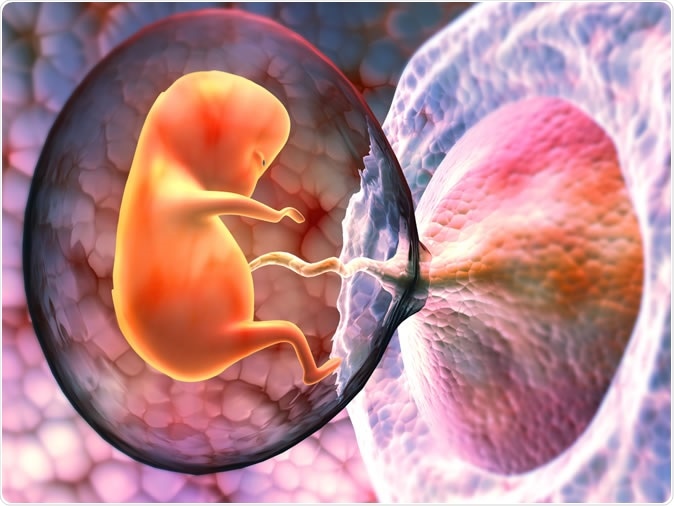A new study in rats shows that older mother rats develop poorer placentas which are in turn related to later risk of heart problems in their male offspring. The study, published in the journal Scientific Reports, shows that both male and female offspring are smaller in size when the mother is older. However, the placental development in older mothers with male fetuses is especially impaired, leading to worse placental function. As a result, heart problems are more common in later life in these offspring, as is high blood pressure.
In human reproduction, mothers are considered to be elderly when the pregnancy occurs over the age of 35 years. To mimic these conditions, the researchers included rats who became pregnant at an age that is comparable for this species. They looked at placental development in these aged pregnant rats.
The placenta in pregnancy
The placenta is a vital organ in pregnancy, as it carries oxygen and nutrients to the fetus and transports wastes away to be disposed off by the maternal metabolism. It is also the source of a host of chemical signals that help the mother’s body to support the development of the fetus. Moreover, it keeps out toxins and bacteria in the mother’s blood so they don’t affect the pregnancy. It even keeps hormone levels normal, especially stress hormones. However, the placenta is a dynamic organ and its functioning changes as required, to optimize growth conditions for the fetus. For example, when the mother is affected by malnutrition or hypoxia, or stress, the placenta compensates to ensure better fetal growth.

Human fetus inside the womb. Image Credit: Explode / Shutterstock
Elderly pregnancy
Pregnancy at advanced ages is known to increase the risk of complications for both mother and baby, such as a high blood pressure, gestational diabetes, stillbirth, and poor fetal growth. However, the nature and existence of placental changes in response to the older age of pregnancy is well documented.
An earlier study by these researchers revealed that children born to elderly mothers tend to have impaired heart function and hypertension as they grow older. This trend was reinforced in male offspring. This prompted the current attempt to understand the reason for this risk, as well as whether the sex-related differences were due to a pre-existing difference in intrauterine development of male and female fetuses in elderly mothers.
This study becomes important in view of the rising age at which women are becoming pregnant for the first or second time in developed countries. If the sex of the fetus and the age of the mother are factors that interweave to affect the pregnancy and the long-term health of the offspring, these need to be understood in greater depth.
The study
The researchers looked at pairs of pregnant rats in two age groups: those 3-4 months old (young) and those 9.5-10 months old (corresponding to a human age of 35 years). The placenta in each rat was analyzed and classified according to whether the fetus was male or female. Rats were selected for the study because their body structure and functioning are closely related to that of humans in several important ways.
The findings
Both male and female fetuses showed a reduction in average weight by 20% to 25%. Moreover, oxidative stress is present in the placenta with advanced maternal age. The placental growth, transfer of nutrients, regulation of the mother’s physiology via fetal hormones, are all affected by the differences in placental form and structure, as well as gene expression, caused by later age of conception.
The researchers found that placental development in elderly rat mothers differs a lot depending on whether the fetus is male or female. With female offspring, the placenta showed a different pattern of growth and gene expression that favored fetal wellbeing, sometimes much better even than the placenta in a younger pregnant rat. With a male fetus, the placenta was developed poorly, resulting in inefficient functioning, which restricts intrauterine growth. The volume of nutritive cells was increased more in males than in females, whereas certain genes that support placental function were poorly expressed in males but not in females. This could increase stress exposure in the male fetuses disproportionately, impacting their future health.
According to researcher Tina Napso, elderly pregnancy costs the mother more in terms of nutrient sharing with the fetus. As a result, the offspring in such pregnancies show impaired growth patterns compared to those in younger mothers. According to her, “Growth, as well as gene expression in the placenta is affected in older mothers in a manner that partially depends on sex: changes in the placentas of male fetuses are generally detrimental.”
If these findings can be extrapolated to human mothers, knowing the sex of the fetus is an important bit of knowledge that could help improve the way pregnancies in elderly mothers are managed and develop specific interventions to keep these male children healthy over the long term. Moreover, future research could also take these results and work with them to enhance placental function and improve the growth of the fetus.
Journal reference:
Napso, T., Hung, Y., Davidge, S.T. et al. Advanced maternal age compromises fetal growth and induces sex-specific changes in placental phenotype in rats. Sci Rep 9, 16916 (2019) doi:10.1038/s41598-019-53199-x, https://www.nature.com/articles/s41598-019-53199-x